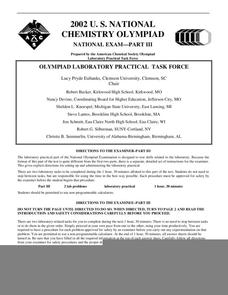Beyond Benign
Green"er" Precipitation Reaction
All sodium carbonate may not have the same amount of carbonate, but it should have the same percent. Learners write and balance an equation to predict the chemical reaction between sodium carbonate and zinc acetate. Through the lab...
Royal Society of Chemistry
Organic Molecules Day—Chemistry Outreach
In search of an organic lab that employs real-life techniques and analysis methods? Groups carry out the nitration of methyl benzoate, then attempt to determine the number and location of the nitro groups added to the benzene ring....
Teach Engineering
Earthquakes Living Lab: The Theory of Plate Tectonics
Find out if your class agrees with Ice Age: Continental Drift ... or if it's just a fun family movie! Class members research the theory of continental drift, examine evidence of plate tectonics, connect this information to engineering,...
Royal Society of Chemistry
Investigating Temperature Changes on Evaporating Liquids—Microscale Chemistry
Is there more to evaporation than just less liquid? Show young scientists the energy transformation that occurs during a phase change through a series of simple experiments. Lab partners place drops of water, ethanol, and ethoxyethane on...
Royal Society of Chemistry
Electrochromic Polymer—Chemistry Outreach
From windows that tint themselves to OLED technology, electrochromic polymers are redefining our ideas about conducting materials! Introduce your chemistry class to the emerging trend with an exciting lab activity. Budding materials...
Curated OER
Coin Lab
In this experimental design worksheet, students experiment with three coins, a dropper and water. They determine how many drops of water they can put on each coin. They answer questions about their experiment and they design an...
Curated OER
Electric Shock
In this electrical learning exercise, students answer a series of 17 questions about electrical shock and electrical safety. This learning exercise is printable and the answers are available on-line.
Curated OER
Relationships and Biodiversity Lab
In this relationships and biodiversity worksheet, students investigate the relationships between 4 plants sample using 7 different tests. These include looking at structural characteristics of the plants, seeds and stems, using paper...
Curated OER
Goggle Safety
In this goggle safety worksheet, students describe different types of eye injuries. They observe pictures of eye injuries and list six different types. This one-page worksheet contains five problems.
Curated OER
Nutrient Analysis Lab
In this nutrient analysis lab worksheet, students perform several experiments in a lab setting. Students test products for carbohydrates (monosaccharides and polysaccharides), proteins, lipids, and starches.
Curated OER
Rate of Solution Lab
In this rate of solution activity, students determine how quickly a solute dissolves in a solvent by testing one independent variable such as temperature, particle size or the amount of stirring. Students design their experiments and...
Curated OER
Types of Chemical Reactions Lab
In this chemical reactions worksheet, learners experiment with several different reactions and identify each as a single replacement, double replacement, synthesis, decomposition or combustion reaction. Students observe the changes in...
Curated OER
Chemical and Physical Changes Lab
In this chemical and physical change worksheet, learners conduct a variety of experiments with unknown solutions and make observations. Students determine if the properties of the solutions have changed and if there is a chemical or...
Curated OER
Mystery Powder Lab
In this mystery powder activity, students determine the identify of 6 unknown samples by testing them with cabbage juice for pH, vinegar, iodine for starch and heat. Students determine the identity of the mystery powders using their...
Curated OER
Ionic vs. Covalent Compounds Lab
In this ionic and covalent compound instructional activity, high schoolers investigate the properties of three unknown substances in order to determine if they are ionic or covalent compounds. They write conclusions about their results.
Teach Engineering
Cell Membrane Experimental Design
Grandma said to gargle with salt water for a sore throat. Was she right? In the last part of the seven-part unit, lab groups design an experiment to test a cells reaction to salt solutions. The pupils conduct their experiment to answer...
Curated OER
Lab Activity: Model of the Planets
This worksheet leads the class through the calculations needed to construct circles to represent the planets of our Solar System. The actual values are provided, as are suggested calculations to create the scale diameters. The ten...
Curated OER
Safety Equipment Map
In this safety worksheet, students create a map of their science laboratory at school in order to know where the safety equipment is located in case of an emergency. They identify the given safety features on their map.
Curated OER
2006 U.S. National Chemistry Olympiad Part III
In this chemistry Olympiad lab worksheet, students are given two lab problems to design experiments. Topics include determining the mass percentage of a given compound and determining an unknown metal using quantitative and qualitative...
Curated OER
2002 U.S. National Chemistry Olympiad National Exam - Part III
Two laboratory problems are put forth for chemistry high schoolers. They are to plan and carry out an experiment that will answer each of the questions. The first asks them to investigate a relationship between the surface area of a...
Curated OER
A Solubility Curve for Potassium Nitrate
Step-by-step laboratory instructions are listed so that chemistry explorers can consider the solubility of potassium nitrate. They combine their results with those of other lab groups and then graph the data to display the solubility...
Curated OER
More on Conduction and Convection
Why do some items feel colder when they are the same temperature? How should you keep your soda cold? What makes the wind blow? These are just some of the things middle schoolers discover when completing a lesson on conduction and...
It's About Time
Solutions, Suspensions, and Colloids
Chemists are frequently in suspension, but not because they misbehave! Scholars mix various items with water to create solutions, suspensions, and colloids. They test each one to determine their differences and properties. The resource...
It's About Time
Identifying Matter
High schoolers test wood splints that have been soaked in mystery solutions to identify the different colors it produces when lit. The lesson concludes with a reading passage and analysis questions.

























